Up next, a guitarist who has the blues in his veins:
Eric Patrick Clapton was born March 30, 1945 in Surrey, England. He was a member of the Yardbirds, John Mayall & the Bluesbreakers, Cream, Blind Faith, and Derek & the Dominoes.

Clapton received an acoustic Hoyer guitar at age 13 but it was difficult to play and he lost interest. Two years later, Eric picked it up again and this time, began playing on a regular basis. Early on, he was influenced by the blues. After leaving Hollyfield School in Surbiton, England in 1961, Clapton studied briefly at the Kingston College of Art.
Clapton was beginning to attract attention with is guitar playing. He started performing as a duo with David Brock in the pubs around Surrey. When he was seventeen, Clapton joined an R&B group known as the Roosters.

In October, 1963, Clapton joined the Yardbirds. Drawing from blues guitarists such as B.B. King, Freddie King and Buddy Guy, Clapton had a unique style. The Yardbirds played blues covers and gained a large following after replacing the Rolling Stones as the resident group at the Crawdaddy Club in Richmond. The group toured England and in March, 1965 had their first big hit--"For Your Love". But Clapton didn't like the direction the band was going, preferring blues music, and left the band.
Clapton joined John Mayall & the Bluesbreakers in 1965, only to quit a few months later. Eric joined a band called the Glands but in November rejoined Mayall. Clapton played on the album Blues Breakers - John Mayall - With Eric Clapton, but left the group for the final time before the album was released.
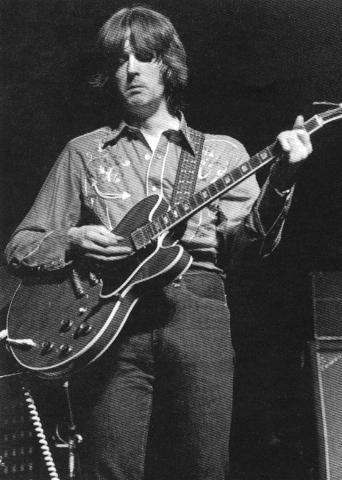
Clapton immediately formed the group Cream with bassist Jack Bruce and Ginger Baker on drums. Eric developed as a singer, songwriter and guitarist while with Cream. The group made their debut at the Twisted Wheel Club in Manchester on July 29, 1966. Cream became famous for extended solos and high-volume blues jamming in their live performances.
Though Clapton had gained a great reputation in the U.K., a young guitarist was emerging in the U.S. that would steal his thunder, one Jimi Hendrix. Clapton had not yet visited the United States, but Cream performed nine shows at the RKO Theater in New York City in March, 1967. The group recorded Disraeli Gears in New York in May.
In just over two years, Cream had sold several million records and played throughout the U.S. and Europe. But drug and alcohol use by the group led to tension between the three members and eventually its demise.

Cream's farewell album, Goodbye, featured the group captured live at the Forum in Los Angeles. The album also included the studio single "Badge", co-written by Clapton and George Harrison. The two became friends and Eric played on "While My Guitar Gently Weeps" on the White Album by the Beatles.
When Harrison released his solo album, Wonderwall Music, in 1968, Clapton played on that LP as well. The pair would often play on stage together as each other's guest.
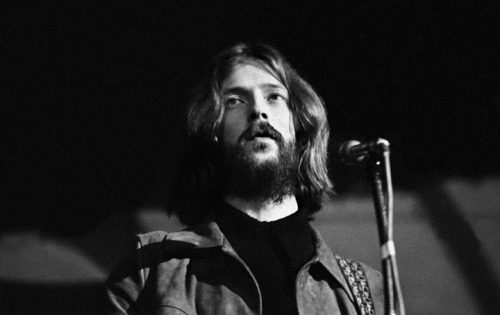
Clapton joined Blind Faith in 1969 with Baker, Steve Winwood of Traffic and Ric Grech of Family. The group debuted before 100,000 fans in London's Hyde Park on Jun 7, 1969. They gave concerts in Scandinavia and the United States before their only album was released. The self-titled Blind Faith album contained only six songs, and one of them ("Do What You Like") was a 15-minute jam. The group broke up after less than seven months.
Eric then joined Delaney and Bonnie for live performces and played two concerts as a member of John Lennon's Plastic Ono Band, including a performance at the Toronto Rock and Roll Revival in September, 1969 that was released as the album Live Peace in Toronto 1969.
Using the backing group of Delaney and Bonnie and session players that included Stephen Stills and Leon Russell, Clapton recorded his first solo album. The self-titled debut included the hit "After Midnight". Clapton then helped Harrison record All Things Must Pass in 1970, and also recorded with Ringo Starr, the Plastic Ono Band, Billy Preston, Leon Russell and Dr. John during this period.
Clapton then assembled a new band consisting of the rhythm section of Delaney and Bonnie, keyboardist Bobby Whitlock, bassist Carl Radle and drummer Jim Gordon. The group took the name Derek & the Dominoes.

Clapton's close friendship with Harrison introduced him to George's wife, Pattie Boyd, and like low-life scum, he became deeply infatuated with her. Initially, Boyd turned down his advances. But then unbelievably, Clapton actually put his thoughts down into writing for the album Layla and Other Assorted Love Songs in 1970. Duane Allman plays slide guitar on the album, which was recorded at Criteria Studios in Miami, Florida.
Jimi Hendrix died eight days after Derek & the Dominoes had recorded a cover of Jimi's "Little Wing" as a tribute to him. One day before the death of Hendrix, Clapton had purchased a left-handed Fender Stratocaster that he had planned to give to Jimi as a birthday gift. The album got lukewarm reviews, and Allman returned to the Allman Brothers Band.
A second album was planned but egos got in the way and the group split. Clapton had his romantic longings, along with drug and alcohol addiction. He withdrew from recording to isolation at his home. This hiatus from music was interrupted only by the Concert for Bangladesh in 1971, where Clapton passed out, was revived, and then finished his performance.
In 1973, Pete Townshend of the Who organized a comeback concert for Clapton at the Rainbow Theatre in London to help Eric kick his addictions.
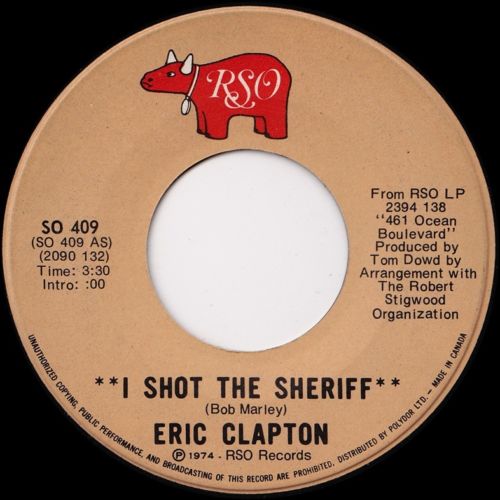
In 1974, Pattie Boyd left George Harrison for his supposed friend Clapton. Clapton had stopped using heroin but drank heavily. He assembled a new band that included vocalist Yvonne Elliman and recorded 461 Ocean Boulevard in 1974. "I Shot the Sheriff" became Clapton's first #1 song. Clapton released There's One in Every Crowd in 1975. The band toured throughout the world in support of the album.
In 1976, Clapton joined several others in paying tribute to the farewell performance of the group that calls itself The Band, a show that was filmed for the documentary The Last Waltz. Clapton recorded one of his most popular albums, Slowhand, in 1978, which featured the hits "Lay Down Sally" and "Wonderful Tonight", as well as his cover of the J.J. Cale song "Cocaine".
In 1981, Clapton was invited to appear at the Amnesty International benefit The Secret Policeman's Other Ball. Eric played alongside Jeff Beck and three tracks from that performance were released on the album of that show.

Clapton had committed himself to Christianity, which helped him rid himself of heroin, but in 1982, he finally admitted he was an alcoholic and checked in at Hazelden Treatment Center in Center City, Minnesota. Eric was so bad off that on the flight in, he drank and drank, because at the time he felt alcohol was the only thing worth living for. The help at the Treatment Center had to practically carry him into the clinic.
Against doctors' orders, Clapton began working on his next album, Money and Cigarettes. In 1984, Clapton performed on Roger Waters' solo album and toured following its release. Clapton also played at the Live Aid concert in 1985. As Clapton recovered from his addictions, he produced Behind the Sun in 1985 and August in1986 with Phil Collins. August peaked at #3 in the U.K. and featured "It's In the Way That You Use It", which was featured in the movie The Color of Money.
Clapton and Collins toured, and two videos, Eric Clapton Live from Montreux and Eric Clapton and Friends were filmed. Eric won a British Academy Television Award for his work with Michael Kamen on the score for the 1985 serial Edge of Darkness. In 1989, Clapton released the album Journeyman, which contained blues, jazz, soul and rock, and got assistance from noted artists George Harrison, Phil Collins, Daryl Hall, David Sanborn, Chaka Khan and Robert Cray.
However, it wasn't enough that Clapton had stolen Pattie Boyd from "friend" Harrison. While married to Boyd, Clapton began a year-long relationship with Yvonne Kelly. The two had a daughter, Ruth, in January 1985. Boyd finally divorced Clapton in 1988 after his affair with Italian model Lory Del Santo, who gave birth to son Conor in 1986.

The Brit Awards gave Clapton an award for Outstanding Contribution to Music in 1987. In 1990, Clapton gave 24 concerts at the Royal Albert Hall. Clapton then set out on a tour with blues guitarist Stevie Ray Vaughan, but on August 27, Vaughan and three members of their road crew were killed in a helicopter crash between concerts. Then on March 20, 1991, Clapton's four-year-old son, Conor, died after falling from the 53rd-floor window of his mother's friend's apartment in New York City.
 Clapton expressed his grief in the song "Tears in Heaven", included on his Unplugged album. Clapton won six Grammys for the effort: "Tears in Heaven" won Song of the Year, Record of the Year and Best Male Pop Vocal Performance while Unplugged won Album of the Year and Best Rock Vocal Performance and Eric also won Best Rock Song for "Layla". Unplugged reached #1 and has now sold over 10 million copies in the United States. "Tears in Heaven" also won Best Male Video at the 1992 MTV Video Music Awards.
Clapton expressed his grief in the song "Tears in Heaven", included on his Unplugged album. Clapton won six Grammys for the effort: "Tears in Heaven" won Song of the Year, Record of the Year and Best Male Pop Vocal Performance while Unplugged won Album of the Year and Best Rock Vocal Performance and Eric also won Best Rock Song for "Layla". Unplugged reached #1 and has now sold over 10 million copies in the United States. "Tears in Heaven" also won Best Male Video at the 1992 MTV Video Music Awards.
In October, 1992, Clapton performed at Bob Dylan's 30th Anniversary Concert at Madison Square Garden in New York City. Cream briefly reunited in 1993 to perform at the ceremony inducting them into the Rock & Roll Hall of Fame, and the trio played four sold-out shows at London's Royal Albert Hall and three at Madison Square Garden in 2005.
Clapton brought the electric guitar out for his 1994 album From the Cradle, which featured his versions of old blues standards. Eric then recorded "Change the World", which was featured in the movie Phenomenon and won the Grammy for Song of the Year in 1997. Clapton also recorded an album of electronic music with Simon Climie under the pseudonym TDF.

In 1998, Clapton released Pilgrim, his first album of new material in nearly a decade, and the following year did collaborations with Carlos Santana and B.B. King. In 1999, Clapton won the Grammy for Best Male Pop Vocal Performance for "My Father's Eyes".
In 2001, Eric released the album Reptile, and performed "Layla" and "While My Guitar Gently Weeps" at the Party at the Palace in 2002. In November, Clapton performed at and was the musical director for the Concert for George at the Royal Albert Hall, a tribute to George Harrison, wo had died a year earlier of cancer. In 2004, Clapton released two albums of Robert Johnson covers, Me and Mr. Johnson and Sessions for Robert J.
In 2005, Clapton performed in the Tsunami Relief Concert in Cardiff to aid victims of the 2004 Indian Ocean earthquake. He then released the album Back Home and invited Derek Trucks and Doyle Bramhall II to join his band for a 2006-2007 world tour. A collaboration with J.J. Cale, The Road to Escondido, was released in 2006, which also included contributions from Derek Trucks and Billy Preston.
In 2008, Clapton performed with Steve Winwood at Madison Square Garden and played guitar on Winwood's album Nine Lives. The former Blind Faith bandmates then performed in 14 concerts throughout the United State the following year.

In 2009, Clapton performed at a concert to celebrate the 40th year of the Allman Brothers band. Eric performed two shows with Jeff Beck at the O2 Arena in London and the two continued with shows in New York City, Toronto and Montreal. Clapton also did a tour with Roger Daltrey and another with Winwood.
Clapton released a new album, Clapton in September, 2010. He then toured South America and Japan.
Clapton credits Robert Johnson, B.B. King, Freddie King, Albert King, Buddy Guy and Hubert Sumlin as guitar influences.
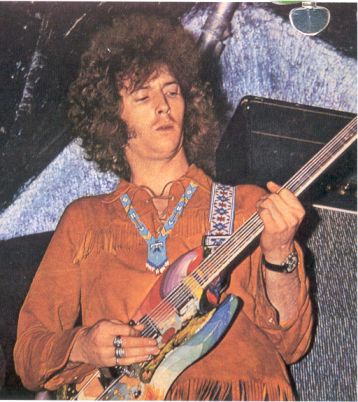
In a career spanning over 50 years, Clapton has made many choices in the guitars he plays. While with the Yardbirds, Clapton played a Fender Telecaster, a Fender Jazzmaster, a double-cutaway Gretsch 6120 and a 1964 Gibson ES-335. Beginning in 1965, Clapton began using Gibson guitars exclusively, beginning with his Gibson Les Paul. In 1967, Eric purchased a 1964 Gibson SG and in 1968, a Gibson Firebird.
In 1969, Eric switched to the Fender Stratocaster. He bought six Stratocasters, giving three away to friends. Clapton then assembled the best components of the remaining three to create the guitar known as "Blackie", his favorite until it was retired in 1985. Fender has since produced 275 "Blackie" replicas.
In 1988, Fender honored Clapton with the signature Eric Clapton Stratocaster. Eric has also been honored with several signature acoustic guitars made by C.F. Martin & Company. Clapton played a 1939 000-42 Martin on the Unplugged album and now plays a custom 000-ECHF Martin.

In 1999, Clapton auctioned off several of his guitars to raise $5 million to support the Crossroads Centre in Antigua, which he founded in 1997. In 2004, Clapton founded the Crossroads Guitar Festival to benefit the Centre.
Clapton has played guitar for many artists: The Brothers in Arms album by Dire Straits, Roger Waters' debut solo album, along with work for Elton John, Frank Zappa and Richie Sambora.

Clapton was one of the first guitarists to use Marshall stacks, and he was one of the pioneers of distorted sound, along with Jimi Hendrix, Dick Dale and Pete Townshend. Eric puts feeling into his solos through the use of vibratos and bends, and also uses hammer-ons and pull-offs. Clapton uses phrasing and delivery to express himself; i.e. pausing during a solo for effect. Clapton is capable of great speed but unlike many of today's players, also has the musical knowledge that tells him when to play fast and when not to.
Clapton has influenced many guitarists, including Eddie Van Halen, Stevie Ray Vaughan, Brian May, Tony Iommi, Duane Allman, Slash, Joe Satriani, Derek Trucks, Gary Moore, Alex Lifeson and Richie Sambora, guitarists all ranked in The Top 100* on Inside the Rock Era.
In 1983, Clapton was presented the Silver Clef Award from Princess Michael of Kent for his outstanding contribution to British music. In 1994, Eric was recognized with the Officer of the British Empire medal for his service to music. In 2004, he was promoted to Commander of the British Empire. In 2006, Eric was given the Lifetime Achievement Award from the Grammys as a member of Cream.
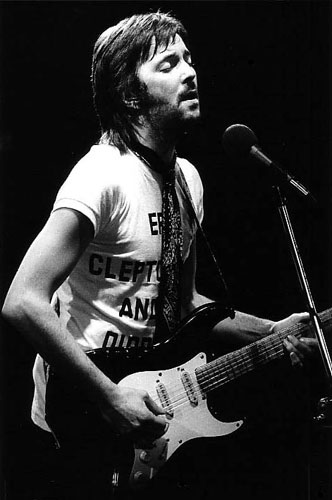
Clapton is the only three-time inductee into the Rock & Roll Hall of Fame: as a solo artist and as a member of both the Yardbirds and Cream. We're into the Top 20 now, and Eric takes the #16 position*.
#16: Eric Clapton, Cream, Blind Faith, Derek & the Dominoes, solo
51 years as an active guitarist
("I Shot the Sheriff" solo)
Eric Patrick Clapton was born March 30, 1945 in Surrey, England. He was a member of the Yardbirds, John Mayall & the Bluesbreakers, Cream, Blind Faith, and Derek & the Dominoes.
Clapton received an acoustic Hoyer guitar at age 13 but it was difficult to play and he lost interest. Two years later, Eric picked it up again and this time, began playing on a regular basis. Early on, he was influenced by the blues. After leaving Hollyfield School in Surbiton, England in 1961, Clapton studied briefly at the Kingston College of Art.
Clapton was beginning to attract attention with is guitar playing. He started performing as a duo with David Brock in the pubs around Surrey. When he was seventeen, Clapton joined an R&B group known as the Roosters.

In October, 1963, Clapton joined the Yardbirds. Drawing from blues guitarists such as B.B. King, Freddie King and Buddy Guy, Clapton had a unique style. The Yardbirds played blues covers and gained a large following after replacing the Rolling Stones as the resident group at the Crawdaddy Club in Richmond. The group toured England and in March, 1965 had their first big hit--"For Your Love". But Clapton didn't like the direction the band was going, preferring blues music, and left the band.
Clapton joined John Mayall & the Bluesbreakers in 1965, only to quit a few months later. Eric joined a band called the Glands but in November rejoined Mayall. Clapton played on the album Blues Breakers - John Mayall - With Eric Clapton, but left the group for the final time before the album was released.

Clapton immediately formed the group Cream with bassist Jack Bruce and Ginger Baker on drums. Eric developed as a singer, songwriter and guitarist while with Cream. The group made their debut at the Twisted Wheel Club in Manchester on July 29, 1966. Cream became famous for extended solos and high-volume blues jamming in their live performances.
Though Clapton had gained a great reputation in the U.K., a young guitarist was emerging in the U.S. that would steal his thunder, one Jimi Hendrix. Clapton had not yet visited the United States, but Cream performed nine shows at the RKO Theater in New York City in March, 1967. The group recorded Disraeli Gears in New York in May.
In just over two years, Cream had sold several million records and played throughout the U.S. and Europe. But drug and alcohol use by the group led to tension between the three members and eventually its demise.

Cream's farewell album, Goodbye, featured the group captured live at the Forum in Los Angeles. The album also included the studio single "Badge", co-written by Clapton and George Harrison. The two became friends and Eric played on "While My Guitar Gently Weeps" on the White Album by the Beatles.
When Harrison released his solo album, Wonderwall Music, in 1968, Clapton played on that LP as well. The pair would often play on stage together as each other's guest.

Clapton joined Blind Faith in 1969 with Baker, Steve Winwood of Traffic and Ric Grech of Family. The group debuted before 100,000 fans in London's Hyde Park on Jun 7, 1969. They gave concerts in Scandinavia and the United States before their only album was released. The self-titled Blind Faith album contained only six songs, and one of them ("Do What You Like") was a 15-minute jam. The group broke up after less than seven months.
Eric then joined Delaney and Bonnie for live performces and played two concerts as a member of John Lennon's Plastic Ono Band, including a performance at the Toronto Rock and Roll Revival in September, 1969 that was released as the album Live Peace in Toronto 1969.
Using the backing group of Delaney and Bonnie and session players that included Stephen Stills and Leon Russell, Clapton recorded his first solo album. The self-titled debut included the hit "After Midnight". Clapton then helped Harrison record All Things Must Pass in 1970, and also recorded with Ringo Starr, the Plastic Ono Band, Billy Preston, Leon Russell and Dr. John during this period.
Clapton then assembled a new band consisting of the rhythm section of Delaney and Bonnie, keyboardist Bobby Whitlock, bassist Carl Radle and drummer Jim Gordon. The group took the name Derek & the Dominoes.

Clapton's close friendship with Harrison introduced him to George's wife, Pattie Boyd, and like low-life scum, he became deeply infatuated with her. Initially, Boyd turned down his advances. But then unbelievably, Clapton actually put his thoughts down into writing for the album Layla and Other Assorted Love Songs in 1970. Duane Allman plays slide guitar on the album, which was recorded at Criteria Studios in Miami, Florida.
Jimi Hendrix died eight days after Derek & the Dominoes had recorded a cover of Jimi's "Little Wing" as a tribute to him. One day before the death of Hendrix, Clapton had purchased a left-handed Fender Stratocaster that he had planned to give to Jimi as a birthday gift. The album got lukewarm reviews, and Allman returned to the Allman Brothers Band.
A second album was planned but egos got in the way and the group split. Clapton had his romantic longings, along with drug and alcohol addiction. He withdrew from recording to isolation at his home. This hiatus from music was interrupted only by the Concert for Bangladesh in 1971, where Clapton passed out, was revived, and then finished his performance.
In 1973, Pete Townshend of the Who organized a comeback concert for Clapton at the Rainbow Theatre in London to help Eric kick his addictions.

In 1974, Pattie Boyd left George Harrison for his supposed friend Clapton. Clapton had stopped using heroin but drank heavily. He assembled a new band that included vocalist Yvonne Elliman and recorded 461 Ocean Boulevard in 1974. "I Shot the Sheriff" became Clapton's first #1 song. Clapton released There's One in Every Crowd in 1975. The band toured throughout the world in support of the album.
In 1976, Clapton joined several others in paying tribute to the farewell performance of the group that calls itself The Band, a show that was filmed for the documentary The Last Waltz. Clapton recorded one of his most popular albums, Slowhand, in 1978, which featured the hits "Lay Down Sally" and "Wonderful Tonight", as well as his cover of the J.J. Cale song "Cocaine".
In 1981, Clapton was invited to appear at the Amnesty International benefit The Secret Policeman's Other Ball. Eric played alongside Jeff Beck and three tracks from that performance were released on the album of that show.

Clapton had committed himself to Christianity, which helped him rid himself of heroin, but in 1982, he finally admitted he was an alcoholic and checked in at Hazelden Treatment Center in Center City, Minnesota. Eric was so bad off that on the flight in, he drank and drank, because at the time he felt alcohol was the only thing worth living for. The help at the Treatment Center had to practically carry him into the clinic.
Against doctors' orders, Clapton began working on his next album, Money and Cigarettes. In 1984, Clapton performed on Roger Waters' solo album and toured following its release. Clapton also played at the Live Aid concert in 1985. As Clapton recovered from his addictions, he produced Behind the Sun in 1985 and August in1986 with Phil Collins. August peaked at #3 in the U.K. and featured "It's In the Way That You Use It", which was featured in the movie The Color of Money.
Clapton and Collins toured, and two videos, Eric Clapton Live from Montreux and Eric Clapton and Friends were filmed. Eric won a British Academy Television Award for his work with Michael Kamen on the score for the 1985 serial Edge of Darkness. In 1989, Clapton released the album Journeyman, which contained blues, jazz, soul and rock, and got assistance from noted artists George Harrison, Phil Collins, Daryl Hall, David Sanborn, Chaka Khan and Robert Cray.
However, it wasn't enough that Clapton had stolen Pattie Boyd from "friend" Harrison. While married to Boyd, Clapton began a year-long relationship with Yvonne Kelly. The two had a daughter, Ruth, in January 1985. Boyd finally divorced Clapton in 1988 after his affair with Italian model Lory Del Santo, who gave birth to son Conor in 1986.

The Brit Awards gave Clapton an award for Outstanding Contribution to Music in 1987. In 1990, Clapton gave 24 concerts at the Royal Albert Hall. Clapton then set out on a tour with blues guitarist Stevie Ray Vaughan, but on August 27, Vaughan and three members of their road crew were killed in a helicopter crash between concerts. Then on March 20, 1991, Clapton's four-year-old son, Conor, died after falling from the 53rd-floor window of his mother's friend's apartment in New York City.

In October, 1992, Clapton performed at Bob Dylan's 30th Anniversary Concert at Madison Square Garden in New York City. Cream briefly reunited in 1993 to perform at the ceremony inducting them into the Rock & Roll Hall of Fame, and the trio played four sold-out shows at London's Royal Albert Hall and three at Madison Square Garden in 2005.
Clapton brought the electric guitar out for his 1994 album From the Cradle, which featured his versions of old blues standards. Eric then recorded "Change the World", which was featured in the movie Phenomenon and won the Grammy for Song of the Year in 1997. Clapton also recorded an album of electronic music with Simon Climie under the pseudonym TDF.

In 1998, Clapton released Pilgrim, his first album of new material in nearly a decade, and the following year did collaborations with Carlos Santana and B.B. King. In 1999, Clapton won the Grammy for Best Male Pop Vocal Performance for "My Father's Eyes".
In 2001, Eric released the album Reptile, and performed "Layla" and "While My Guitar Gently Weeps" at the Party at the Palace in 2002. In November, Clapton performed at and was the musical director for the Concert for George at the Royal Albert Hall, a tribute to George Harrison, wo had died a year earlier of cancer. In 2004, Clapton released two albums of Robert Johnson covers, Me and Mr. Johnson and Sessions for Robert J.
In 2005, Clapton performed in the Tsunami Relief Concert in Cardiff to aid victims of the 2004 Indian Ocean earthquake. He then released the album Back Home and invited Derek Trucks and Doyle Bramhall II to join his band for a 2006-2007 world tour. A collaboration with J.J. Cale, The Road to Escondido, was released in 2006, which also included contributions from Derek Trucks and Billy Preston.
In 2008, Clapton performed with Steve Winwood at Madison Square Garden and played guitar on Winwood's album Nine Lives. The former Blind Faith bandmates then performed in 14 concerts throughout the United State the following year.

In 2009, Clapton performed at a concert to celebrate the 40th year of the Allman Brothers band. Eric performed two shows with Jeff Beck at the O2 Arena in London and the two continued with shows in New York City, Toronto and Montreal. Clapton also did a tour with Roger Daltrey and another with Winwood.
Clapton released a new album, Clapton in September, 2010. He then toured South America and Japan.
Clapton credits Robert Johnson, B.B. King, Freddie King, Albert King, Buddy Guy and Hubert Sumlin as guitar influences.

In a career spanning over 50 years, Clapton has made many choices in the guitars he plays. While with the Yardbirds, Clapton played a Fender Telecaster, a Fender Jazzmaster, a double-cutaway Gretsch 6120 and a 1964 Gibson ES-335. Beginning in 1965, Clapton began using Gibson guitars exclusively, beginning with his Gibson Les Paul. In 1967, Eric purchased a 1964 Gibson SG and in 1968, a Gibson Firebird.
In 1969, Eric switched to the Fender Stratocaster. He bought six Stratocasters, giving three away to friends. Clapton then assembled the best components of the remaining three to create the guitar known as "Blackie", his favorite until it was retired in 1985. Fender has since produced 275 "Blackie" replicas.
In 1988, Fender honored Clapton with the signature Eric Clapton Stratocaster. Eric has also been honored with several signature acoustic guitars made by C.F. Martin & Company. Clapton played a 1939 000-42 Martin on the Unplugged album and now plays a custom 000-ECHF Martin.

In 1999, Clapton auctioned off several of his guitars to raise $5 million to support the Crossroads Centre in Antigua, which he founded in 1997. In 2004, Clapton founded the Crossroads Guitar Festival to benefit the Centre.
Clapton has played guitar for many artists: The Brothers in Arms album by Dire Straits, Roger Waters' debut solo album, along with work for Elton John, Frank Zappa and Richie Sambora.

Clapton was one of the first guitarists to use Marshall stacks, and he was one of the pioneers of distorted sound, along with Jimi Hendrix, Dick Dale and Pete Townshend. Eric puts feeling into his solos through the use of vibratos and bends, and also uses hammer-ons and pull-offs. Clapton uses phrasing and delivery to express himself; i.e. pausing during a solo for effect. Clapton is capable of great speed but unlike many of today's players, also has the musical knowledge that tells him when to play fast and when not to.
Clapton has influenced many guitarists, including Eddie Van Halen, Stevie Ray Vaughan, Brian May, Tony Iommi, Duane Allman, Slash, Joe Satriani, Derek Trucks, Gary Moore, Alex Lifeson and Richie Sambora, guitarists all ranked in The Top 100* on Inside the Rock Era.
In 1983, Clapton was presented the Silver Clef Award from Princess Michael of Kent for his outstanding contribution to British music. In 1994, Eric was recognized with the Officer of the British Empire medal for his service to music. In 2004, he was promoted to Commander of the British Empire. In 2006, Eric was given the Lifetime Achievement Award from the Grammys as a member of Cream.

Clapton is the only three-time inductee into the Rock & Roll Hall of Fame: as a solo artist and as a member of both the Yardbirds and Cream. We're into the Top 20 now, and Eric takes the #16 position*.
.jpg)
No comments:
Post a Comment
Note: Only a member of this blog may post a comment.